Akiya of Japan: How to Buy Abandoned Houses (Akiya) in Japan
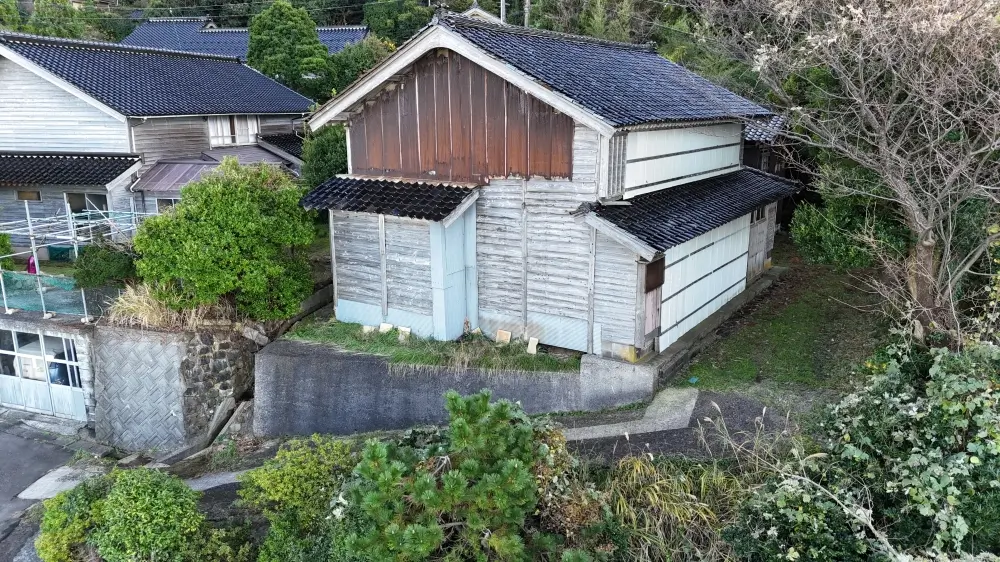
We have long heard that houses in Japan are expensive. What if, all of a sudden, someone tells you that you can buy a cheap house in Japan?
Imagine the waves such a statement will cause! The same thing happened with the Akiya phenomenon in Japan.
A relatively unknown word, “Akiya,” suddenly became a commonly used word among foreigners in Japan and many outside Japan. You will frequently hear foreigners discussing ways to buy Akiya in Japan.
Akiya, or abandoned houses, have always existed in Japan. Lately, however, they have become a buzzword, especially among foreigners in and out of Japan. Many foreigners are exploring the opportunities to buy Akiya houses in Japan.
This article will discuss finding and buying Akiya (empty houses) in Japan, including various considerations and hidden costs. It will also include interviews with people who have experience buying Akiya houses, including investors.
(If you are looking to buy a normal house or apartment, then you may want to read Renting Vs. Buying a House in Japan.)
What is an Akiya?
Before going to the concept of Akiya, let’s understand this word. Akiya is written as 空き家 in Japanese. The first kanji ‘空’ in the word means sky or emptiness. 空き (aki) means vacant, and the Kanji 家 (ya or, i.e.) stands for “House.” Hence, the word “Akiya” means a vacant house.
However, the meaning “vacant house” does not describe the real concept of this term, and the correct meaning is “an abandoned house.” Naturally, an abandoned thing would be cheap; therefore, abandoned houses, i.e., Akiya, are also cheap in Japan.
Number of Abandoned Houses in Japan
According to the latest government data from October 2023, there are 9 million abandoned houses in Japan. So, 14% of the total number of houses in Japan, and this number is continuously growing.
Let’s try to see the severity of this issue by putting the figures into a different perspective. If we consider an average of four-member families per house, 9 million abandoned houses can accommodate 36 million people or roughly 29% of Japan’s estimated total population of 124 million in 2024.
Moreover, suppose we combine these numbers with the fact that Japan’s population is continuously declining and is expected to drop to as low as 87 million by 2070. In that case, we can see where the Akiya phenomenon in Japan is heading.
Why are There so Many Akiya or Empty Houses in Japan?
There are various interlinked reasons behind Japan’s large number of Akiya, or abandoned houses. However, the root cause is a very high level of urbanization. Let’s look at the following graph to see how the urban population grew from the 1960s to 2022 in Japan:
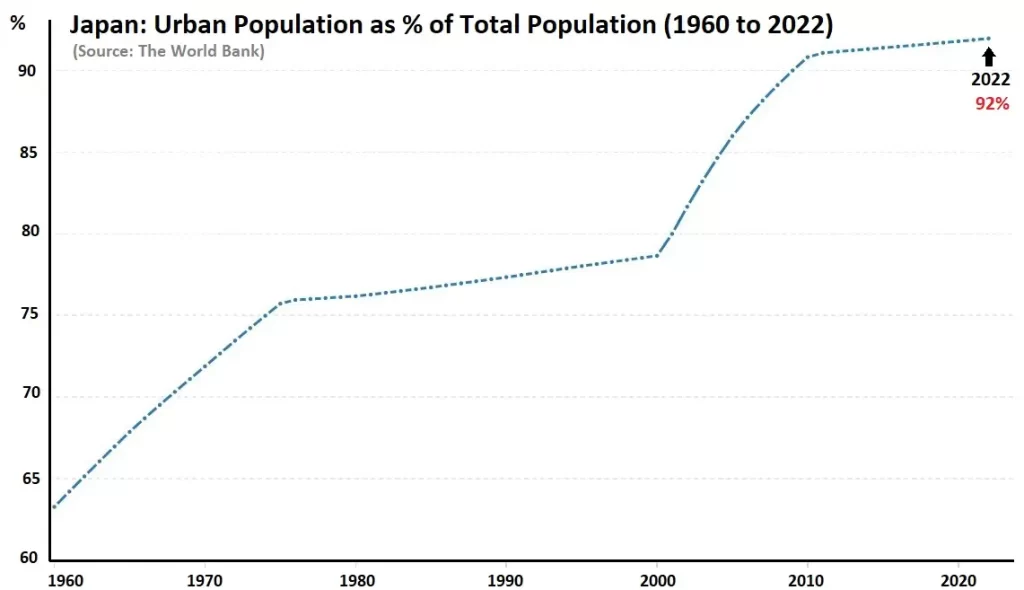
The above data from the World Bank shows that in 2022, 92% of Japan’s total population live in urban areas. That means that the rural population in Japan has shrunk from over 37% in 1960 to 8% in 2022.
Let’s compare the above figures with the rural population of the five economies of the world:
- USA: 17%
- China: 36%
- Germany: 22%
- Japan: 8%
- India: 64%
This high level of outflux from rural to urban areas resulted in many empty houses in Japan.
Moreover, even if we do not expect the outflow of people from rural areas to increase exponentially in the coming years, this is because the existing small rural population of 8% is further declining because of aging. This continuously declining population will continue to result in more empty houses in rural areas.
But why do empty houses become abandoned houses?
Well, here come the other reasons in the picture, and they are as follows:
Cost of maintenance (including taxes and renovations)
There are two annual taxes for property in Japan as follows:
- Fixed Asset Tax (kotei shisan zei / 固定資産税): The annual fixed asset tax can vary from 0.3% to 4% depending on the location; however, generally, it is 1.4% of the assessed value. The point to be noted here is that it’s on the assessed value, which keeps depreciating. Moreover, as most individual houses are wooden houses in Japan, a life span of 20 years is considered for them for depreciation.
- City Planning Tax (toshi keikaku zei / 都市計画税): The annual city planning tax typically ranges from 0.2% to 0.4% of the house’s assessed value.
Please note that although the above two taxes do not seem to cause a big dent because of the depreciating accessed value, the owner must pay the house’s mandatory fire insurance.
However, more than the taxes, the crucial factor is the maintenance cost. This maintenance cost includes periodic upgrades and miscellaneous costs such as protecting and repairing wooden houses against termite damage.
Inheritance Tax
Japan has one of the highest inheritance taxes in the world. The standard deduction is Japanese yen 30 million plus 6 million per legal heir.
However, after that, the inheritance tax starts at 10% and can go as high as 55%. Therefore, it may sometimes not even make sense to inherit and maintain the house if the person is not planning to use it.
All these factors, apart from cases when there is no family to inherit the house, make these empty houses abandoned.
How Much Akiya Houses Cost
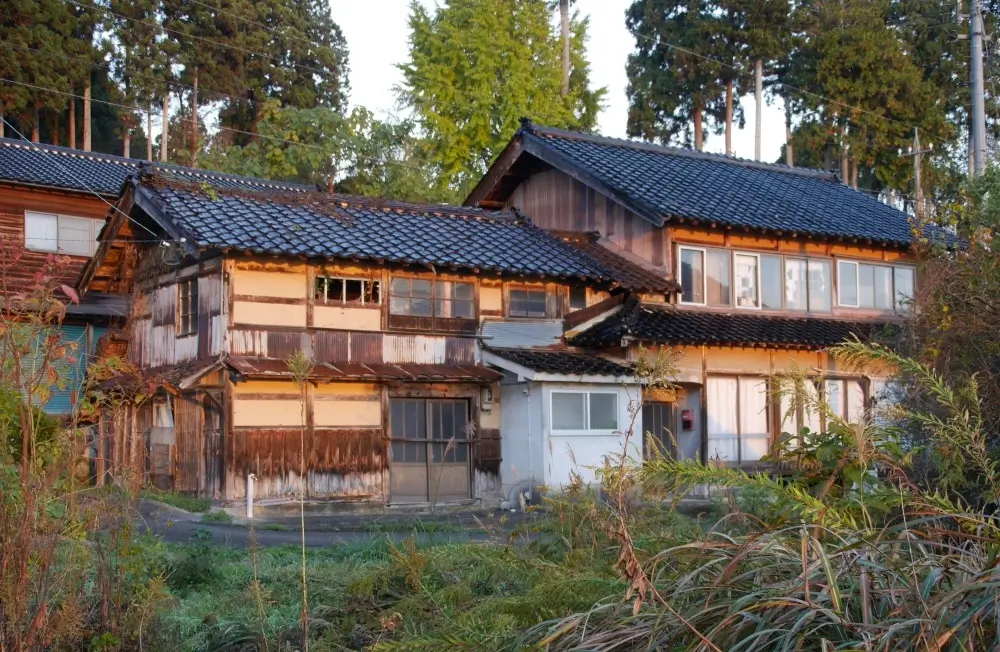
The prices for Akiya houses depend on their location and condition. You should not be surprised to find that some of these houses are offered free or almost free of cost. However, please note that nothing comes for free. So, if a house is free, it will have a huge renovation cost and associated headaches.
Therefore, it is recommended that you forget about such free houses unless you find something with real hidden benefits.
Apart from this, you can find some good abandoned Akiya houses for as cheap as USD 50,000 to USD 100,000. In fact, you can find some good houses to buy for under USD 50,000.
How to Find Cheap Empty Houses in Japan
Finding cheap Akiya houses in Japan is quite easy, thanks to the government’s proactive initiatives to solve the abandoned house problem and help revive the rural economy. However, assessing and evaluating a good house that meets your objectives requires serious effort and costs time and money.
The following are two ways to find your ideal cheap house in Japan:
Unassisted Direct Searches
If you can afford to visit houses mostly away from the big cities, there are Akiya Banks for you. These Akiya Banks list such available houses with various details. You can browse the listings to find the ones that may meet your selection criteria.
However, this approach may not yield the desired results without good experience evaluating and purchasing real estate properties, especially houses. You will likely spend much time and money visiting multiple houses to evaluate, which may go to waste.
Regardless, it is recommended that you initially browse these listings even if you wish to use assisted searches to familiarize yourself with the world of Akiya houses.
Two comprehensive resources with an extensive listing of such abandoned houses all over Japan are as follows:
LIFULL HOME’S
LIFULL HOME’S a housing and other real estate information service that gathers information from various real estate companies and municipal governments across Japan.
Their Akiya Bank, or abandoned house listing project, was selected as a model project by the Ministry of Land, Infrastructure, Transport and Tourism‘s “National Vacant House and Vacant Land Banks” initiative.
LIFULL HOMES is a private commercial organization; however, as a government-approved and licensed “Akiya Bank,” it tries to provide as much accurate information about abandoned houses as possible.
At Home’s Akiya Bank
Another listing of abandoned houses in Japan is At Home Co., Ltd.’s Akiya Bank. At Home Company is also under the license of the Ministry of Land, Infrastructure, Transport and Tourism’s initiative for Akiya Banks. As of May 2024, 789 municipal governments participated in At Home’s abandoned house listings with over 8,000 houses.
Other Resources
In addition to the above two government-approved and licensed Akiya banks, many local municipal governments publish lists of abandoned houses in their jurisdiction.
However, it’s not practical to search for such listings by visiting so many websites if you have not already decided on a particular locality.
Considering the above pain area, the website Akiya Banks connects you to such sections on various municipal governments’ websites. They also have a property portal that lists cheap abandoned houses all over Japan.
If you are on a limited budget, another useful resource for finding very cheap houses in Japan is Inakanoseikatsu (Rural Life). This website lists houses up to 3 million Japanese yen, including abandoned houses available free of cost.
Akiya2.0, which offers assisted search services and is mentioned under that section, also needs to be mentioned here. They work with municipal governments to translate and compile local Akiya listings into a comprehensive free English database.
They are reaching out to hundreds of municipalities all over Japan one by one but expect to complete indexing by 2025.
Akiya2.0 is also the official inbound marketing partner to the National Kominka Association of Japan to list their high-grade traditional Kominka; which are more expensive than the average Akiya, but these houses are carefully curated and QCed by the Kominka Association.
Some of the other such online resources are Koryoya, Inakanet, and Furusato-net.
Assisted Searches
As mentioned, finding the right kind of house may require significant effort and cost. Especially if you do not have much experience evaluating properties. Considering this, it may be a good idea to use Akiya consulting services. These consulting services can point you to better options for your search for cheap houses in Japan.
Some such consulting resources are as follows:
- Akiya2.0: Co-founded by Terrie Lloyd, who has 40+ years of experience in Japan and has founded 19 companies in Japan. Another co-founder is Lester Goh, a trained professional architect. Akiya2.0 provides services not only to find good abandoned cheap houses in Japan but also to transform them. We interviewed Lester Goh, co-founder of Akiya2, about their buying cheap abandoned houses, i.e., Akiya in Japan. This interview also mentions their end-to-end service spectrum, which you can read towards the end of this guide.
- Cheap Houses Japan: CheapHousesJapan.com is an initiative of Michael, who researched many Akiya houses to buy one for himself. Later, he launched this online resource to help others who wish to buy a cheap house in Japan. Their newsletter comes with 20 handpicked houses every week.
- Akiya Mart: Headquartered in San Francisco, USA, AkiyaMart is a website for English-speaking foreigners who want to find cheap houses in Japan using various search criteria.
- Akiya & Inaka: Akia & Inaka, which stands for Abandoned House & Rural Areas, is another English website that helps you find a cheap house in Japan.
How to Buy Akiya in Japan
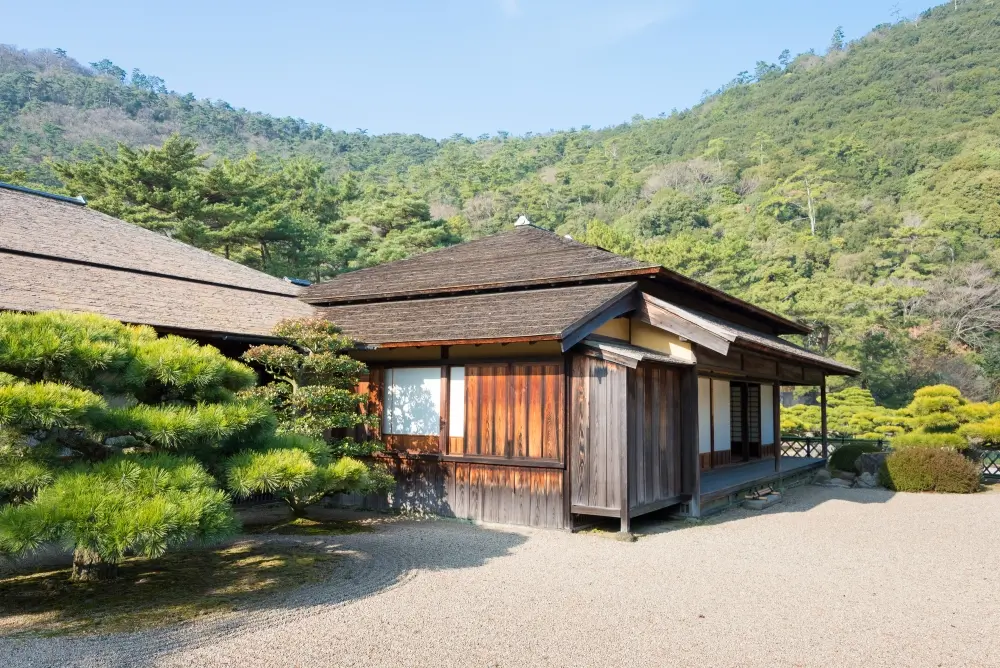
As we have seen, there are plenty of cheap abandoned houses in Japan, approximately 9 million to be more precise. However, buying such an Akiya house that meets your needs requires a lot of consideration and groundwork. Let’s have a look at various points you need to consider to be able to buy the right house for you:
Objective
Knowing your longer-term objective before searching and buying the Akiya house is very important. Some of the objectives people buy these houses in Japan are as follows:
As a holiday home
Typically, this is one of the common reasons foreigners buy houses in rural areas to turn them into vacation homes. The objective may be to use the house for short holidays or sometimes extended stays, with work-from-home becoming common. Apart from those holidays, you may make it a side business by renting it.
You may want to buy a house with nice views, e.g., ocean or river facing. Moreover, depending on whether you use a car or not, you may also wish to check on the shopping and other such facilities nearby. If you take a car with you, you may not mind the distances much.
To manage them as rental vacation homes for others
This is, again, an objective that attracts foreigners to buy Akiya houses in natural surroundings and turn them into short-term rental properties for holidays as a side business.
If you plan to buy a house for such a purpose, the surrounding views will be quite important. People are easily attracted to beach or riverfront houses. However, the house size may also be quite important because, in many cases, apart from families and friends, some larger company-sponsored groups may like to rent them.
To actually live in the countryside
The percentage of people who wish to live in the countryside or inaka in Japan by purchasing a house is not high. Obviously, a decision to move to the countryside depends on many situational factors. Among these factors, the profession or job is among the most critical. Other factors, such as family and age, are almost equally important.
However, we should not completely discount such a possibility. So, suppose you are seriously planning to move to the house you plan to purchase to enjoy the ruler Japan’s more peaceful life. In that case, you will need to consider the availability of various amenities.
What facilities a rural area would offer will not be comparable to urban settings. Moreover, if it’s a very rural area, you may find that the facilities are insufficient for a comfortable life. Therefore, staying in the locality for a few days is advisable to evaluate.
Living and farming
Some abandoned houses may be farmhouses or come with a farm. If you are inclined to go for farming as a hobby or, in rare cases, as a profession, you may decide to purchase such a house.
However, if you do not intend to go farming, there is no point in buying such a house. If you do not get the approval to convert the farmland into residential, it will be a waste of money. Moreover, some contracts may make it mandatory for the property owner to engage in farming.
Renovation Cost
You got your eyes set on a house! The location is great, the cost fits your budget, and the house looks good. Is that enough?
Remember that you are planning to buy not just an already lived-in house but an abandoned one without maintenance.
Even if you have prior experience purchasing houses, are you trained to evaluate the condition of the overall structure? This evaluation includes flooring and roofs, electricals, plumbing, hidden termite damage in wooden houses, etc.
The renovation cost of an abandoned house can turn your dreams of buying a cheap house into nightmares. But wait—when there is a problem, there is a solution. The only thing is that the solution comes at an additional cost. However, a solution with justified cost is worth investing in instead of having big pains later.
So, there is the good news—Japan doesn’t have a dearth of building inspectors and building inspection companies. At a reasonable cost of 50,000 to 60,000 Japanese Yen, these companies inspect the potential house you wish to buy. In some cases, depending on the company and location of the house, the pricing may go up to a maximum of 100,000 yen, which comes to around USD 665 at the conversion rates during the first half of 2024.
Hiring these professional inspectors before buying your dream house in Japan is highly recommended.
Some of the building inspection companies in Japan are as follows:
However, please note that the above list is just a few examples, and you can find many others which suit your requirements.
The location from Safety Perspectives
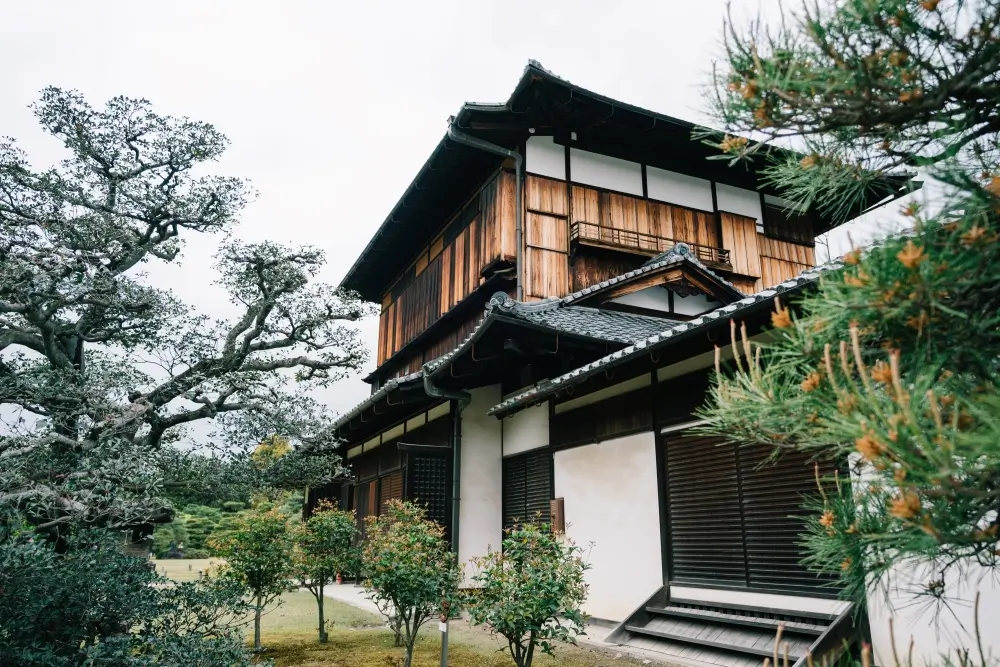
Natural disasters like earthquakes and landslides during heavy rains are common in Japan. Considering these factors, you must evaluate more than just the house’s location and surroundings.
To check the history of natural disasters, it’s worthwhile to do some internet searches, talk to the neighbors and the local municipal government, and also get some help from the building inspection professionals, which I mentioned above.
Taxes
We mentioned that one must pay the fixed asset and city planning taxes annually to own a house. However, you also need to budget for the taxes while acquiring the house, which are as follows:
When considering acquiring a property in Japan, it’s crucial to account for the various taxes that apply during the purchase process.
Taxes for House Purchases in Japan
- Property Acquisition Tax: This is a one-time tax imposed upon property acquisition, with rates varying based on the property’s type and value. The current residential land and buildings rate is 3% of the assessed value. However, there are potential reductions, particularly for newly constructed houses or land intended for residential purposes. It’s worth noting that starting from April 2024, the land tax is slated to increase to 4%.
- Title Registration Stamp Duty: This tax applies whenever a property is registered or its registered information, such as ownership, is altered. The rate for acquiring real estate is 2% of the assessed value for land and another 2% for buildings.
- Japanese Consumption Tax: This tax is relevant solely to property purchases (excluding land) and amounts to 10% of the SALES price, not the assessed value. Buyers may be eligible to reclaim this amount if the property is subsequently rented out for short-term holiday rentals within the following year after purchase.
- Contract Stamp Duty: Executing a contract within Japan for a property transaction incurs a stamp duty, the amount of which depends on either the property’s value or the sum stated in the contract. Both the buyer and the seller are liable for this duty:
- ¥10,000 for transactions ranging from ¥10m to ¥50m
- ¥30,000 for transactions ranging from ¥50m to ¥100m
- ¥60,000 for transactions ranging from ¥100m to ¥500m
- Withholding Tax: In cases where the seller resides overseas, the buyer is responsible for paying a withholding tax (10.21%) to the Japanese tax office. Therefore, only the remaining 89.71% of the purchase price is remitted to the seller. Typically, this is facilitated by the real estate agent on behalf of the buyer, with the process mandated to be completed by the 10th day of the subsequent month following the sales transaction’s conclusion.
Note about Housing Taxes
Remember that the assessed value utilized for tax computation can significantly deviate from the market value.
Additionally, it’s essential to investigate any regional disparities or supplementary taxes unique to the locality where the property is situated. While this summary offers a broad outline, it’s prudent to seek advice from a local tax expert for accurate assessments and current updates.
Contractual Terms
Before you decide to buy your dream cheap house, it is crucial to read the terms of the contract very carefully.
Some of the main points you need to check and negotiate if you find them unfavorable are as follows:
- Is there any age restriction because the locality wishes to have a larger, younger population?
- Is there a clause allowing full-time farming if farmland is attached to the house? If not, you may need to talk to and get approval from the “nogyo iinkai” (農業委員会), the region’s agricultural committee.
- Are there any terms you need to rent before the ownership is transferred to you?
- Will you own the land or house outright or only the house while the land remains on lease?
Interviews with Akiya Experts
To give you a better insight into buying these abandoned houses known as Akiya in Japan, we interviewed some Akiya experts and consultants who help the buyers in their quest of not only acquiring and empty houses in Japan but with related matters to help you with inspections and renovations and more.
Let’s hear what these Akiya experts suggest and how they help you for purchasing an Akiya in Japan:
Interview with Akiya 2.0 Co-Founder
It is always good to hear the experts’ opinions, so we talked to Lester Goh of Akiya2.0 about buying these cheap Akiya houses in Japan.
EJable: Could you please tell us something about Akiya2.0?
Lester: These cheap houses in Japan, called Akiya, or abandoned (empty) houses, have become a hot topic among foreigners who want to buy cheap houses in Japan.
There are many services to help foreigners find these cheap houses, but earlier, there was a complete lack of end-to-end services. Here, Akiya2.0, with a team of professionals with extensive experience in Japan and Akiya, and the most distinguishing factor of having a professional architect, comes into the picture.
Our services include finding the right Akiya house according to the buyer’s preferences, including the objective, location preference, budget, and other factors; house inspection; contractual formalities; renovation; and finally, transforming your Akiya into a sustainable investment.
EJable: What is the average price of an Akiya?
Lester: Prices can vary greatly depending on the house’s location, size, and condition. Some abandoned houses are free, while others may cost 7.5 million to 10 million Japanese yen, or USD 50,000 or 75,000. However, typically, you can find a reasonable Akiya house in the range of 1 million to 5 million Japanese yen.
EJable: Can a non-resident foreigner buy a house in Japan?
Lester: Yes, even if you are not working and living in Japan, you can purchase a house there just as a Japanese national can. A foreigner can buy a house in Japan while visiting Japan on a tourist visa or even from outside Japan. The only difference is that you cannot get the housing loans.
EJable: In your experience, what are the main objectives for foreigners when purchasing these cheap homes in Japan?
Lester: Not all, but many of the Akiya houses are in rural areas of Japan. According to 2024 government data, the largest share, 13.6%, is in the Kagoshima prefecture, followed by Kochi prefecture with 12.9% and Ehime and Tokushima with 12.2%.
So, generally, people wish to buy these houses in Japan to use them as holiday homes and rental properties during the rest of the year. The most common way to rent these houses is through Air B&B.
EJable: With your expert knowledge and experience, what are your suggestions for people who want to purchase abandoned houses or Akiya in Japan?
Lester: The most important consideration before buying an Akiya or even searching for an empty house in Japan is knowing your objective and deciding on the location.
Then comes the condition of the house. I would say that buying a very cheap house in a very bad condition generally turns out to be a very expensive option. So, do not opt for a very cheap house.
You should also check about any associated legal issues. For example, a house attached to a farm may require you to have a farming license and engage in farming activities. So, you need to check the formalities for converting the farming land to residential land.
You should also check the local building and architectural laws about the house condition you wish to buy.
EJable: Thank you, Lester. I am sure that your tips about purchasing these cheap houses in Japan will be helpful for people who wish to buy Akiya in Japan.
Interview with Cheap Houses, Japan Founder Michael
We talked to Michael of CheapHousesJapan.com about his experience of buying Akiya in Japan and how his company helps foreigners find good abandoned houses in Japan:
EJable: When and how did you learn about Akiya as a foreigner, and what piqued your interest?
Michael: I lived in Japan for about seven years. While working at a travel agency, I traveled extensively around Japan to research new destinations for our catalog.
I remember visiting rural areas and seeing these beautiful houses for sale for $20,000 or $30,000. I kept thinking, “Why are these houses so cheap?” “Why is no one buying them?” And “Would I be allowed to buy one as a foreigner?”
I searched for information online, but there wasn’t much available in English at the time (around 2012-2014), so I ended up reading books in Japanese about the property market.
It got me thinking that I wanted to buy a house in Japan one day. It felt like I had discovered a secret that nobody else knew about.
EJable: How did you go about buying the Akiya?
Michael: After I left Japan in 2014, I kept thinking about someday owning a house there. A few years later, when my career took off and I could finally afford it, I bought a modest Akiya house to use as a vacation home.
I felt it was a pretty good deal considering the house’s condition (basically move-in ready) and the location: about a 20-minute walk to the nearest train station and an hour by train to an international airport.
I studied real estate terminology in advance and took on the process myself. It was difficult, and I encountered a fair share of stress and headaches.
English-speaking intermediaries and agents are now available to help buy these abandoned houses, usually at an added cost. But I think they are 100% worth it to avoid hassle and mistakes!
EJable: What should someone think about when considering an Akiya purchase?
Michael: First, for those outside of Japan, I recommend seriously considering the responsibilities of owning foreign property. There are yearly property taxes, ongoing repairs, maintenance, and neighborly responsibilities to be tended to. It’s much harder to swing by and check in on your house from a distance.
Second, many people become interested in Akiya houses because of their affordable prices. However, these properties typically don’t appreciate value over time like in many other countries. People like myself purchase houses in Japan for lifestyle value—not as a financial investment.
EJable: How do you select good houses to feature with Cheap Houses Japan?
Michael: I spend countless hours searching for abandoned house listings online every week. Over the years, I’ve gotten a good idea of what people are interested in, so I combine that understanding with my insights from living and purchasing a house in Japan.
Japan has a huge gap between cheap rural areas and expensive urban areas. The drawback of super-cheap houses often lies in extensive renovation requirements, remote locations lacking infrastructure and amenities, and limited resale potential.
In my opinion, the sweet spot in abandoned / empty houses, or Akiyas in Japan, is between $30,000 and $100,000. Here, you can find move-in-ready houses—or those that need minimal renovations—and access public transport. I try to share that on social media and in the Cheap Houses Japan newsletter.
Conclusion about Purchasing Akiya House
Remember that buying an Akiya in Japan is an attractive option for owning a cheap house here. You may wish to have a vacation home in peaceful, mostly rural areas of Japan or buy a house for business purposes; however, proper research and evaluation are crucial.
Buying a house in Japan only because it is dirt cheap should not be an objective. A very cheap house in a very bad condition may cause unjustifiable stress and financial losses in the long term. Instead, buy a house with a decent but affordable price tag and a clear objective, and you will enjoy your purchase for years to come.
(Credit for the pictures is to Akiya2.com.)

A long-term ex-pat in Japan, Himanshu comes with an IT background in SAP consulting, IT Business Development, and then running the country operations of an IT consulting multinational. Himanshu is the co-founder and Managing Director of ReachExt K.K. and EJable.com. He is also an Advisory Board Member of a Silicon Valley AI/IoT startup.
